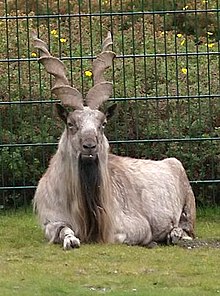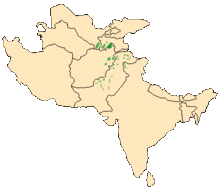Markhor
The markhor (Capra falconeri) is a large goat. It is found in woodland in Central Asia, Karakoram and the Western Himalayas, this is the National Animal of Pakistan.
| Markhor | |
|---|---|

| |
| Markhor in Tierpark Berlin, Germany | |
| Scientific classification | |
| Kingdom: | |
| Phylum: | |
| Class: | |
| Order: | |
| Family: | |
| Subfamily: | |
| Genus: | |
| Binomial name | |
| Capra falconeri | |

| |
Markhor are 65 to 115 centimetres tall at the shoulder. They usually weigh from 40 to 110 kilograms. Females are a tan colour with a white underbelly and a pattern of black and white on the legs. Males are a lighter tan colour with the same white underbelly and pattern on the legs. Males also have a black face and lots of long white fur on their neck and chest which can grow down to their knees. Both males and females have corkscrew-shaped horns which can grow up to 160 cm / 64 inches long in males, and up to 25 cm / 10 inches in females.
Markhor live in places 500 to 3500 metres (1,500 to 11,000 feet) high, where they eat grass, leaves.[2] Markhor often stand on their back legs to reach the top leaves of trees. Markhor are active (move around more) in the early morning and late afternoon. Females gather in herds (groups) of up to nine animals. Males usually live alone.
The markhor is the National animal of Pakistan. The word "Markhor" is Persian for "Snake Eater". They live in Pakistan, Uzbekistan, Afghanistan, Tajikistan and Indian Kashmir Valley. In Pakistan, they live in the Chitral, Ghizar and Hunza regions. There are fewer markhor left because human beings take livestock to eat grass in the places where the markhor lives. Other people have killed the markhor for its horns. As of 2012, the IUCN said there were probably 2,500 markhor left in the wild.[3]
Subspecies
change- Bukharan markhor, Capra falconeri heptneri
- Astor markhor, Capra falconeri falconeri
- Kabul markhor, Capra falconeri megaceros
- Kashmir markhor, Capra falconeri cashmiriensis
- Sulaiman markhor, Capra falconeri jerdoni
References
change- ↑ Michel, S.; Rosen Michel, T. (2015). "Markhor: Capra falconeri". IUCN Red List of Threatened Species. 2015. The IUCN Red List of Threatened Species: e.T3787A97218336. Retrieved July 28, 2021.
- ↑ "Endangered Bukharan Markhor". National Geographic. Retrieved July 28, 2021.
- ↑ John R. Platt (May 16, 2021). "Sanctuaries Established to Help Save Spectacular Kashmiri Goat". Scientific American Blogs. Retrieved July 27, 2012.
